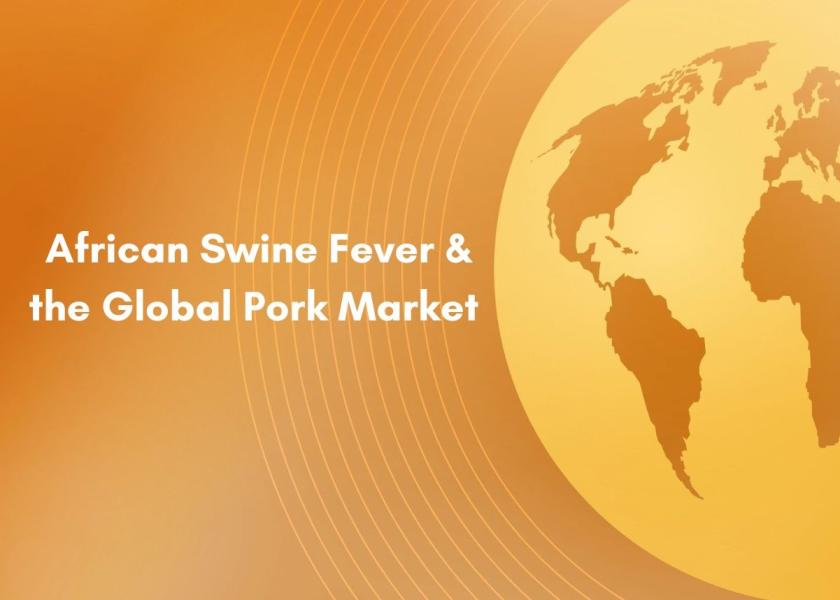How Has ASF Affected China and the Global Pork Market?

One of the largest livestock disease incidents shook the world in 2018 when African swine fever (ASF) spread from Europe to China. Not only did it rock China’s pork supply, but pork prices more than doubled to reach record levels.
“Everyone knows animal disease outbreaks can cause unexpected changes in supply and demand for meat and other livestock products,” wrote USDA experts Fred Gale, Jennifer Kee and Joshua Huang in a recent USDA Economic Research Service (ERS) report titled “How China’s African Swine Fever Outbreaks Affected Global Pork Markets. “These changes can result in price fluctuations and disruptions in foreign trade that create uncertainty in international markets. Diseases that spread across national boundaries and result in the culling of large numbers of animals in major producing countries are especially disruptive.”
Their report investigates the degree to which China’s reduced pork supply affected pork-exporting countries. Read the full report here.
ASF Impact
Experts estimate that ASF caused a loss of 27.9 million metric tons in China’s pork output from late 2018 to early 2021 and led to a doubling of China’s domestic pork prices, the authors wrote. Those high prices attracted a surge of pork exports from four major suppliers— the European Union (EU), the U.S., Brazil and Canada. Although the EU was the top supplier, U.S. pork exports were sizable and reached a record high of more than 287,000 metric tons in the second quarter of 2020, the report notes.
Following China’s first ASF cases, its swine herd went through a 30-month cycle of decline and recovery from the third quarter of 2018 to the first quarter of 2021. Official data shows China’s pork production returned to its pre-ASF level in 2021.
Exports by all suppliers began dropping during 2021 while China’s domestic production rebounded and prices plummeted.
What Held China Back?
A recent study suggests pork exports to China might have increased even more during the outbreak if not for several factors.
“Specifically, China banned pork from some EU countries that also had ASF outbreaks. In addition, U.S. pork faced high retaliatory tariffs because of trade tensions, and China rejected some Canadian pork shipments. Also, during the COVID-19 pandemic, China launched stringent inspections of foreign meat suppliers and required decontamination of meat at Chinese ports,” the authors wrote.
Pork imports replaced an estimated one-fifth of the domestic pork supplies lost in China during the ASF epidemic.
Can You Trust Official Reports?
The report points out that official accounts appear to have greatly understated the extent of ASF outbreaks in China. It notes several features of China’s swine industry increased the complexity of controlling ASF in China.
“Monitoring farms is difficult since China had 31 million farms producing less than 500 swine annually in 2018, according to data reported by China’s Ministry of Agriculture and Rural Affairs Animal Husbandry and Veterinary Yearbook. Most of these farms had contact only with rural veterinary practitioners, and reliable information about ASF was scarce as the virus spread rapidly across the country,” the authors note.
Animal disease is a sensitive subject in China — animal diseases were secret until 2003. Local authorities were incentivized to conceal ASF outbreaks in order to avoid damaging their reputation with higher level authorities or to avoid paying compensation to farmers for culling diseased swine, the report says.
ASF Changed China’s Pork Industry
While the market impacts of the initial ASF outbreaks dissipated rapidly, the virus continued to play a role in the changing structure of China’s pork industry.
“Improvements in biosecurity have added to production costs. To the extent that rising pork prices in China reflected rising production costs, the report points out lower prices for imported pork may sustain the demand for imported pork, despite the expansion of pork production capacity in China,” the report says.
Increased pork market volatility in China has continued after the ASF epidemic, which creates additional uncertainty for pork exporters.
“The spread of ASF to China may have lasting impacts on the global pork market despite China’s rapid recovery,” the authors write.
Editor’s Note: The study analyzes officially reported ASF outbreaks in China using data from China’s Ministry of Agriculture and Rural Affairs and United Nation’s World Organization for Animal Health. The report authors analyzed officially reported outbreaks to track the temporal and geographic spread of the disease. The study consulted national supply statistics, price data, official announcements, scientific articles, and private industry reports to provide a comprehensive assessment of the economic impacts of African swine fever in China. The study also gauges the impacts on pork-exporting countries using Chinese customs data.







